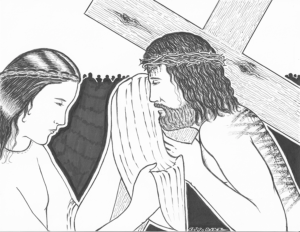Marjorie began as a Catholic Worker at Casa Juan Diego this past summer after her graduation from Saint Francis University in Pittsburgh, Pennsylvania.
In Catholic tradition, there is a saint named Veronica who, as the story goes, was so overcome by the sight of Jesus carrying his cross on the road to be crucified that she handed him her veil to wipe the blood off his face. In return, Jesus left a perfect image of his face on the cloth to serve as a sign of his divinity. On that treacherous walk, countless individuals simply watched. Likely they were so overwhelmed by the monstrosity of the situation that they were afraid to step forward at all. Knowing that crucifixion was inevitable and believing that they were small and powerless, they sat and watched. But Veronica did something that no one else did. She loved as much as she could in the ways that she could. Veronica knew that seconds after wiping the face of Jesus, the blood and sweat would return. The work would be, in essence, fruitless, and yet God saw it as something incredible.
Often I see our work at Casa Juan Diego in this way. There are problems that we are faced with every day that we will never be able to solve. Many come to us with questions to which we don’t know the answers. “When will my husband be released from the detention center at the border to be with us?” “Will there be work for me in New York (or Chicago, or Atlanta, or Washington DC..)? Sometimes it is harder when we do know the answer but it is not what they will want to hear. “Can I get a green card?” “How long will it take for me to get a work permit?” “Will I ever qualify for citizenship?” The life of an immigrant is almost guaranteed to include living from paycheck to paycheck for several years. For many, it will be this way for the rest of their time in the United States.
So how is it that we refrain from the feeling of total despair? How do we continue to wake up every day and work in a place where we can do so little about the “big picture”? The answer is simple– we wipe their faces. We do as Veronica did. We look at the little things and address them with great love. We give out a bag of food at the door with a smile knowing that it will not end hunger. We give our women shampoo and soap and toothpaste, knowing that one day it will run out and they may struggle to buy it all on their own. We hug the children and support them knowing that they will still have to face going to school with students who may laugh at their attempts at learning English. We help women get to immigration appointments, even if we suspect they may never be able to get a green card. Little by little, we walk with them as Veronica once walked with Jesus. The inability to solve the whole problem didn’t stop her from helping in the way she was able, and neither will it for us.
Mother Teresa served with a similar sentiment. She once said “do not worry about why problems exist in the world–just respond to people’s needs”, and the needs here are many. Even as I write, a couple of our little girls are knocking on my door, fingers sticky with mandarin oranges, asking to play before bed. Here at Casa Juan Diego, we pause to drink a cup of coffee with the women in the morning. The women who have been raped, are separated from children who they have left at home, have sacrificed everything to come to a new and foreign land. We pause to color with the children in the afternoon. The children who have just crossed through the jungles and seen people dead, starving, and drowning. Children who haven’t had the security of a safe or comfortable place to sleep in weeks or even months. In the clinic we don’t rush people while we do their intakes, letting them tell us the backstory of their injury, the reason they haven’t been sleeping at night, and the extent of their struggles to access healthcare. When people call our work a band aid to the larger picture, I can’t help but agree. So was wiping the blood off the face of Jesus.
Because the truth of all of it is that at the end of the day or the end of our lives Jesus is not going to ask us how many immigrants we were able to make into citizens or how we fixed the broken system of a government that does not always act in the best interest of the poor. He is going to ask us if we loved our brothers and sisters and if we looked them in the eyes. And so we do. At the end of the day, we might only be able to say that we were a friend to a lonely person, an ear to a weary soul, or a smile to someone hurting but I believe that is more than enough. To do all that we can, with what we can. In return, Jesus will leave an imprint of his face- not on a veil as He did once long ago- but on our very hearts. It is for this that we work and live.
Houston Catholic Worker, January-March 2023, Vol. XLIII, No. 1.


